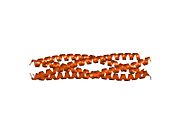VTI1B
Appearance
Vesicle transport through interaction with t-SNAREs homolog 1B is a protein that in humans is encoded by the VTI1B gene.[5][6][7]
Interactions
VTI1B has been shown to interact with STX8.[8][9]
References
- ^ a b c GRCh38: Ensembl release 89: ENSG00000100568 – Ensembl, May 2017
- ^ a b c GRCm38: Ensembl release 89: ENSMUSG00000021124 – Ensembl, May 2017
- ^ "Human PubMed Reference:". National Center for Biotechnology Information, U.S. National Library of Medicine.
- ^ "Mouse PubMed Reference:". National Center for Biotechnology Information, U.S. National Library of Medicine.
- ^ Li HC, Tahara H, Tsuyama N, Ide T (July 1998). "A hVti1 homologue: its expression depends on population doubling levels in both normal and SV40-transformed human fibroblasts". Biochem Biophys Res Commun. 247 (1): 70–4. doi:10.1006/bbrc.1998.8737. PMID 9636656.
- ^ Fischer von Mollard G, Stevens TH (February 1998). "A human homolog can functionally replace the yeast vesicle-associated SNARE Vti1p in two vesicle transport pathways". J Biol Chem. 273 (5): 2624–30. doi:10.1074/jbc.273.5.2624. PMID 9446565.
- ^ "Entrez Gene: VTI1B vesicle transport through interaction with t-SNAREs homolog 1B (yeast)".
- ^ Rual JF, Venkatesan K, Hao T, Hirozane-Kishikawa T, Dricot A, Li N, Berriz GF, Gibbons FD, Dreze M, Ayivi-Guedehoussou N, Klitgord N, Simon C, Boxem M, Milstein S, Rosenberg J, Goldberg DS, Zhang LV, Wong SL, Franklin G, Li S, Albala JS, Lim J, Fraughton C, Llamosas E, Cevik S, Bex C, Lamesch P, Sikorski RS, Vandenhaute J, Zoghbi HY, Smolyar A, Bosak S, Sequerra R, Doucette-Stamm L, Cusick ME, Hill DE, Roth FP, Vidal M (October 2005). "Towards a proteome-scale map of the human protein-protein interaction network". Nature. 437 (7062): 1173–8. Bibcode:2005Natur.437.1173R. doi:10.1038/nature04209. PMID 16189514.
- ^ Subramaniam VN, Loh E, Horstmann H, Habermann A, Xu Y, Coe J, Griffiths G, Hong W (March 2000). "Preferential association of syntaxin 8 with the early endosome". J. Cell Sci. 113 (6): 997–1008. PMID 10683148.
Further reading
- Subramaniam VN, Loh E, Horstmann H, Habermann A, Xu Y, Coe J, Griffiths G, Hong W (2000). "Preferential association of syntaxin 8 with the early endosome". J. Cell Sci. 113 (6): 997–1008. PMID 10683148.
- Antonin W, Holroyd C, Fasshauer D, Pabst S, Von Mollard GF, Jahn R (2001). "A SNARE complex mediating fusion of late endosomes defines conserved properties of SNARE structure and function". EMBO J. 19 (23): 6453–64. doi:10.1093/emboj/19.23.6453. PMC 305878. PMID 11101518.
- Wade N, Bryant NJ, Connolly LM, Simpson RJ, Luzio JP, Piper RC, James DE (2001). "Syntaxin 7 complexes with mouse Vps10p tail interactor 1b, syntaxin 6, vesicle-associated membrane protein (VAMP)8, and VAMP7 in b16 melanoma cells". J. Biol. Chem. 276 (23): 19820–7. doi:10.1074/jbc.M010838200. PMID 11278762.
- Antonin W, Fasshauer D, Becker S, Jahn R, Schneider TR (2002). "Crystal structure of the endosomal SNARE complex reveals common structural principles of all SNAREs". Nat. Struct. Biol. 9 (2): 107–11. doi:10.1038/nsb746. hdl:11858/00-001M-0000-0012-F459-F. PMID 11786915.
- Kreykenbohm V, Wenzel D, Antonin W, Atlachkine V, von Mollard GF (2003). "The SNAREs vti1a and vti1b have distinct localization and SNARE complex partners". Eur. J. Cell Biol. 81 (5): 273–80. doi:10.1078/0171-9335-00247. PMID 12067063.
- Antonin W, Dulubova I, Arac D, Pabst S, Plitzner J, Rizo J, Jahn R (2002). "The N-terminal domains of syntaxin 7 and vti1b form three-helix bundles that differ in their ability to regulate SNARE complex assembly". J. Biol. Chem. 277 (39): 36449–56. doi:10.1074/jbc.M204369200. PMID 12114520.
- Bogdanovic A, Bennett N, Kieffer S, Louwagie M, Morio T, Garin J, Satre M, Bruckert F (2002). "Syntaxin 7, syntaxin 8, Vti1 and VAMP7 (vesicle-associated membrane protein 7) form an active SNARE complex for early macropinocytic compartment fusion in Dictyostelium discoideum". Biochem. J. 368 (Pt 1): 29–39. doi:10.1042/BJ20020845. PMC 1222979. PMID 12175335.
- Martinez-Arca S, Rudge R, Vacca M, Raposo G, Camonis J, Proux-Gillardeaux V, Daviet L, Formstecher E, Hamburger A, Filippini F, D'Esposito M, Galli T (2003). "A dual mechanism controlling the localization and function of exocytic v-SNAREs". Proc. Natl. Acad. Sci. U.S.A. 100 (15): 9011–6. Bibcode:2003PNAS..100.9011M. doi:10.1073/pnas.1431910100. PMC 166429. PMID 12853575.
- Yan Q, Sun W, McNew JA, Vida TA, Bean AJ (2004). "Ca2+ and N-ethylmaleimide-sensitive factor differentially regulate disassembly of SNARE complexes on early endosomes". J. Biol. Chem. 279 (18): 18270–6. doi:10.1074/jbc.M400093200. PMID 14769786.
- Hirst J, Miller SE, Taylor MJ, von Mollard GF, Robinson MS (2005). "EpsinR is an adaptor for the SNARE protein Vti1b". Mol. Biol. Cell. 15 (12): 5593–602. doi:10.1091/mbc.E04-06-0468. PMC 532037. PMID 15371541.
- Rual JF, Venkatesan K, Hao T, Hirozane-Kishikawa T, Dricot A, Li N, Berriz GF, Gibbons FD, Dreze M, Ayivi-Guedehoussou N, Klitgord N, Simon C, Boxem M, Milstein S, Rosenberg J, Goldberg DS, Zhang LV, Wong SL, Franklin G, Li S, Albala JS, Lim J, Fraughton C, Llamosas E, Cevik S, Bex C, Lamesch P, Sikorski RS, Vandenhaute J, Zoghbi HY, Smolyar A, Bosak S, Sequerra R, Doucette-Stamm L, Cusick ME, Hill DE, Roth FP, Vidal M (2005). "Towards a proteome-scale map of the human protein-protein interaction network". Nature. 437 (7062): 1173–8. Bibcode:2005Natur.437.1173R. doi:10.1038/nature04209. PMID 16189514.







